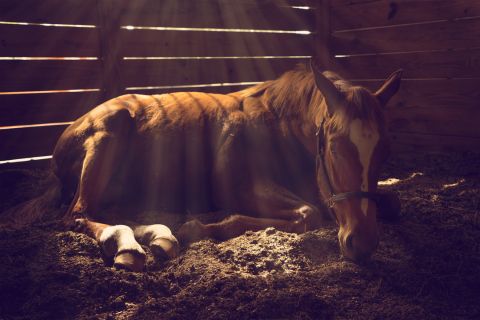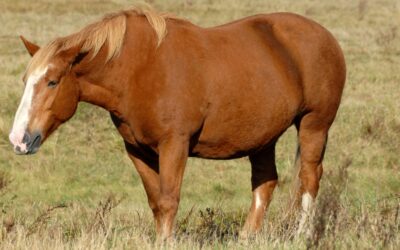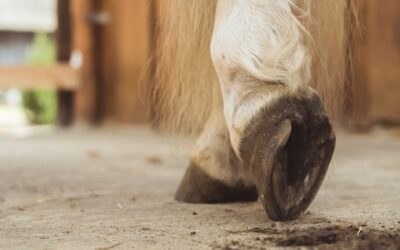
Just like humans, horses can develop allergies to certain foods or ingredients in their diet. A food allergy occurs when the immune system reacts to a specific protein in food, causing various adverse reactions. Although food allergies in horses are relatively rare compared to environmental allergies, they can still occur, causing a variety of health and behavioral issues. Left untreated, food allergies can lead to long-term discomfort, poor performance, and overall poor health. Recognizing the signs of a horse food allergy early on is key to keeping your four-legged companion healthy and happy.
In this blog post, we’ll explore five common signs that your horse might have a food allergy, how to differentiate between allergies and other conditions, and what steps you can take to manage your horse’s food allergy symptoms effectively.
1. Unexplained Skin Issues: Hives, Itching, and Hair Loss
One of the most telling signs of a horse food allergy is the sudden appearance of skin problems. While horses can suffer from skin conditions for a variety of reasons (like insect bites, environmental allergens, or infections), food allergies can specifically manifest as:
- Hives (urticaria): Raised, itchy welts that appear suddenly, often within a few hours of eating. These welts can be small or large and typically show up on the neck, chest, or sides of the horse. Compared to a contact allergy, these hives tend to be more widespread on the horse’s body.
- Itching: Intense itching can cause your horse to rub or bite at its skin, leading to sores, irritation, or hair loss. You may notice your horse rubbing its body against fences, stalls, or trees in an attempt to relieve the itch.
- Hair loss (alopecia): Constant scratching or biting can result in patchy hair loss, especially around areas where the horse rubs frequently. In some cases, you might notice balding spots, particularly in areas affected by hives or irritation.
If your horse has sudden or persistent skin issues that aren’t responding to typical treatments like insect repellents or medicated shampoos, it could be time to consider food as a potential cause.
2. Digestive Upset: Diarrhea or Colic
Another sign that your horse might be dealing with a food allergy is digestive problems. Horses with food allergies often struggle to digest certain ingredients properly, which can result in:
- Diarrhea: Loose stools or watery bowel movements can occur when a horse’s digestive system reacts poorly to an allergen. Chronic diarrhea, especially if it appears soon after eating, is a potential red flag for a food-related issue.
- Colic symptoms: Food allergies can sometimes lead to mild colic-like symptoms, including abdominal pain, gas, bloating, or restlessness. Horses might paw at the ground, roll, or show other signs of discomfort after eating, especially if the food allergy involves grains or additives in their feed.
Digestive upset is particularly concerning, as colic can be life-threatening in severe cases. If your horse frequently experiences digestive issues without a clear cause, it’s worth investigating whether a food allergy might be to blame.
3. Respiratory Problems: Coughing and Nasal Discharge
Although respiratory symptoms are more commonly associated with environmental allergies, food allergies in horses can also develop breathing problems. These can include:
- Chronic coughing or wheezing: Inflammation caused by a food allergy can affect your horse’s airways, leading to a persistent cough or labored breathing. This is more likely to happen if the allergic reaction causes inflammation in the throat or lungs.
- Nasal discharge: Clear, watery nasal discharge can accompany respiratory issues in horses with food allergies. If your horse has a runny nose, especially right after eating, and doesn’t show signs of infection (like fever or thick, colored mucus), food could be the culprit.
If your horse’s respiratory symptoms worsen after feeding or when certain feeds are introduced, this could point to a food-related allergic reaction.
4. Behavioral Changes: Agitation or Lethargy
Food allergies can affect your horse’s behavior in surprising ways. When a horse is uncomfortable due to an allergic reaction, they may show signs of distress or fatigue, such as:
- Agitation or irritability: Horses may become more anxious, restless, or reactive if they’re experiencing discomfort from an allergic reaction. You might notice increased irritability during feeding times or when in the stall, particularly if they are dealing with itching or digestive discomfort.
- Lethargy: On the flip side, some horses may become unusually sluggish or lethargic due to food allergies. If your typically energetic horse seems tired, disinterested, or doesn’t perform as well as usual, a food allergy could be draining their energy levels.
Behavioral changes are often subtle and gradual, but if your horse seems “off” with no clear explanation, it’s important to consider whether something in their diet might be causing discomfort.
5. Poor Coat and Hoof Condition
A healthy horse will typically have a shiny, smooth coat and strong hooves, but food allergies can take a toll on both. Signs of a potential food allergy might include:
- Dull or dry coat: If your horse’s coat starts to lose its shine or becomes rough and brittle, it could be a sign that their diet is triggering an allergic reaction. Skin inflammation caused by food allergies can affect coat quality over time.
- Flaky skin or dandruff: In some cases, food allergies can lead to dry, flaky skin, which might show up as dandruff on the horse’s mane, tail, or coat.
- Weak or cracked hooves: Poor nutrition caused by an inability to properly digest certain allergens can also weaken hooves over time. If your horse’s hooves seem more brittle or prone to cracking, it could be a sign that their diet isn’t providing the necessary nutrients, possibly due to an underlying allergy.
If your horse’s coat or hooves have deteriorated despite receiving proper care and grooming, it’s worth looking into their diet and whether a specific food could be to blame.
What to Do if You Suspect a Food Allergy
If you notice any combination of these signs of a horse food allergy, it’s essential to consult your veterinarian for an accurate diagnosis. Here are a few steps you can take if you suspect a food allergy:
- Work with your vet: Your veterinarian can help rule out other conditions and recommend an appropriate course of action. They may suggest an elimination diet, where potential allergens are removed from your horse’s diet and reintroduced one at a time to pinpoint the problem.
- Try a hypoallergenic feed: If your horse’s allergy seems to be caused by common ingredients in commercial feeds, you might need to switch to a hypoallergenic feed, such as timothy alfalfa hay. These are often free of soy, corn, molasses, and other common allergens.
- Keep a food journal: Track everything your horse eats, as well as any symptoms they experience. This can help you identify patterns and narrow down possible allergens.
- Test for allergies: In some cases, allergy testing—such as blood tests or skin tests—can help identify specific allergens. However, these tests are not always definitive, so an elimination diet is often the most reliable method of diagnosis.
Food allergies in horses can be tricky to diagnose, but recognizing the signs early can make a huge difference in your horse’s health and comfort. From skin reactions to digestive issues and behavioral changes, being aware of how your horse responds to their diet is crucial. By working closely with your veterinarian and making necessary dietary adjustments, you can help your horse live a healthier, allergy-free life.




